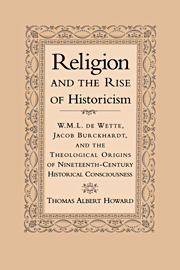 Religion and the Rise of Historicism
Religion and the Rise of Historicism Book contents
- Frontmatter
- Contents
- Acknowledgments
- Introduction: History, Theology, and Modernity
- 1 W. M. L. de Wette: Enlightenment, Romanticism, and Biblical Criticism
- 2 De Wette and Schleiermacher at Berlin (1810–1819): Politics, History, and the Post-Enlightment Transformation of Theology
- 3 De Wette, D. F. Strauss, and the New Christusbild
- 4 Basel, Burckhardt, and de Wette
- 5 History without Centaurs
- Abbreviations: Used in Notes and Bibliography
- Notes
- Bibliography
- Index
Introduction: History, Theology, and Modernity
Published online by Cambridge University Press: 02 December 2009
- Frontmatter
- Contents
- Acknowledgments
- Introduction: History, Theology, and Modernity
- 1 W. M. L. de Wette: Enlightenment, Romanticism, and Biblical Criticism
- 2 De Wette and Schleiermacher at Berlin (1810–1819): Politics, History, and the Post-Enlightment Transformation of Theology
- 3 De Wette, D. F. Strauss, and the New Christusbild
- 4 Basel, Burckhardt, and de Wette
- 5 History without Centaurs
- Abbreviations: Used in Notes and Bibliography
- Notes
- Bibliography
- Index
Summary
[A] secular understanding of reality and the social bond is essentially constituted within the religious field, whether it was nurtured by religion's substance or deployed as an expression of one of its fundamental potentialities.
– Marcel Gauchet, Désenchantement du monde[We] anti-metaphysicians take our fire from the brand kindled by the faith of many centuries.
– Friedrich Nietzsche, Also Sprach ZarathustraIt is largely taken for granted today that a greater historical sense or historical consciousness is a distinguishing feature of modern Western thought. To a large extent, this heightened sensitivity to history and to the “constructed” character of one's ideas and beliefs – historicism as it is generally called and as I shall call it – first developed among German scholars, in universities and academies, at the end of the eighteenth and beginning of the nineteenth century. At this time, it is said, a secular historical consciousness freed itself from long-standing theological conceptions of history. Present-day intellectual and cultural historians have generally portrayed the process as fundamentally discontinuous: history triumphed over the “theological stranglehold” that it had languished under for centuries; the “modern mind” became historicized, emancipated from traditional, biblical-theological modi cognoscendi.
- Type
- Chapter
- Information
- Religion and the Rise of HistoricismW. M. L. de Wette, Jacob Burckhardt, and the Theological Origins of Nineteenth-Century Historical Consciousness, pp. 1 - 22Publisher: Cambridge University PressPrint publication year: 1999


